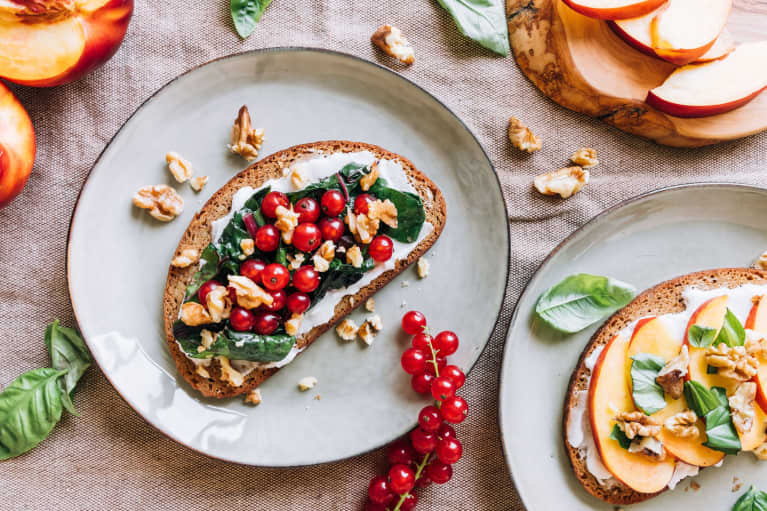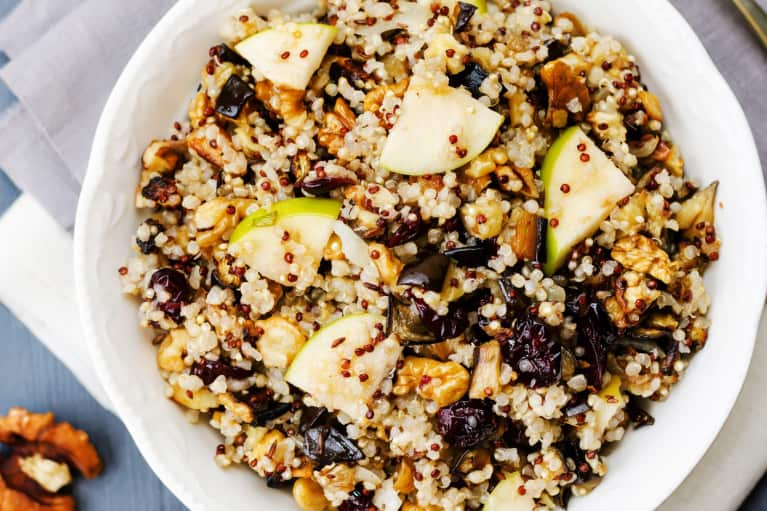
As a medical doctor who specializes in gut health and
functional medicine, I see how chronic inflammation plays out with a
wide range of symptoms.
In one patient, inflammation can lead to migraines, asthma, or allergies. For another, it can lead to an autoimmune disease. But underlying each of these potential outcomes is the same root cause: a gut ecosystem that was knocked out of balance and became inflamed. Chronic inflammation plays a role in nearly every disease on the planet including obesity. Numerous culprits contribute to this low-grade, often-silent inflammation. Chief among them is our modern-day diet.
Once upon a time, we ate about equal amounts of anti-inflammatory omega-3 fatty acids and inflammatory omega-6 fatty acids. That balance helped the body to turn inflammation on and off as needed. Today, however, we eat on average about 20 times more inflammatory fatty acids. That imbalance means inflammation can linger unchecked. Your fork becomes the best way to solve that problem. And a fantastic way to rebalance those fatty acids is to increase your omega-3 fatty acid intake. These anti-inflammatory fatty acids carry an impressive resume for gut health: They help reduce gut inflammation, maintain intestinal wall integrity (to protect against leaky gut), positively affect your gut-brain axis, and support your immune system. Omega-3s have such a profound effect on your gut, in fact, that researchers consider them prebiotics that feeds your healthy gut flora. They carry other benefits too, including affecting cognition and mood to improve mood disorders like anxiety and depression.
And that's where walnuts come in: They come packed with the omega-3 fatty acid α-linolenic acid (ALA), nutrients, and antioxidants. One ounce of walnuts (approximately ¼ cup) contains 4 grams of carbohydrates, 2 grams of fiber, 18 grams of fat, and 4 grams of protein. In fact, of all nuts, walnuts have the highest amount of omega-3s and antioxidant polyphenols that delivers a double whammy against chronic inflammation.
Full disclosure: I'm wary of any food or drink the media hypes as a "superfood." I don't think any one food or drink will suddenly fix all your health problems. That said, walnuts carry a really impressive résumé to fight inflammation, support gut health, and lots more. The primary polyphenol in walnuts is pedunculagin, an ellagitannin. Ellagitannins provide well-known antioxidant and anti-inflammatory benefits that can protect against cancer, heart disease, and neurodegenerative diseases. Walnuts are also rich in vitamin E, a fat-soluble vitamin that works as a powerful antioxidant to protect against the oxidative stress that contributes to cancer, aging, arthritis, and other diseases.
Walnuts also provide good amounts of dietary fiber: About 3.5 ounces contain over 6 grams. For gut health, fiber is a superstar that interacts with gut microbes and helps produce gut-supporting metabolites such as the short-chain fatty acid butyrate. One recent study confirmed why walnuts are my favorite nuts. Researchers assigned 194 healthy people to a walnut-enriched diet that contained 43 grams (less than 2 ounces) of walnuts a day or a nut-free diet. For the first eight weeks, about half of these participants ate walnuts and the other didn't. During the next eight weeks, researchers reversed that order. While eating the walnut-enriched diet, participants reduced fat or carbohydrates (or both) to manage additional calories. The results were really impressive: Eating walnuts significantly affected the microbiome, increasing both the quality and quantity of the good guys.
"Daily intake of 43 [grams] walnuts over eight weeks significantly affects the gut microbiome by enhancing probiotic- and butyric-acid-producing species in healthy individuals," researchers concluded. (Worth noting: That same study also showed eating walnuts improves your lipid profile.)
Walnuts have other benefits too. The long-running Nurses' Health Study found that eating walnuts significantly lowers type 2 diabetes risk among women, regardless of their body mass index (BMI). (Other nuts, fabulous as they can be, didn't do that.) Walnuts can even help you lose weight. One study divided overweight or obese participants into three groups, one of which included 30 grams of walnuts into their daily diet. When researchers followed up three and 12 months later, they found the walnut group had the greatest weight loss and made "significant improvements in healthy food choices." Other research shows that eating walnuts can improve LDL-C (your "bad" cholesterol) and systolic blood pressure.
Those are among the reasons I keep walnuts by my desk for a midafternoon snack when I know I'll be working late. Likewise, I recommend that patients keep walnuts on hand when they experience hunger or cravings throughout the workday or when they unwind watching TV after a long day.
You'll notice many of these studies used an ounce or two of walnuts (or ¼ to ½ cup). Moderate amounts, in other words. Like all nuts, walnuts are high in calories. Overeating them—which is notoriously easy to do—could create the opposite effect. If necessary, portion those walnuts out into ¼ cups in little baggies.
To fight inflammation and get all of their other benefits, enjoy an ounce or two of walnuts daily. When doing so, follow these guidelines:
In one patient, inflammation can lead to migraines, asthma, or allergies. For another, it can lead to an autoimmune disease. But underlying each of these potential outcomes is the same root cause: a gut ecosystem that was knocked out of balance and became inflamed. Chronic inflammation plays a role in nearly every disease on the planet including obesity. Numerous culprits contribute to this low-grade, often-silent inflammation. Chief among them is our modern-day diet.
Once upon a time, we ate about equal amounts of anti-inflammatory omega-3 fatty acids and inflammatory omega-6 fatty acids. That balance helped the body to turn inflammation on and off as needed. Today, however, we eat on average about 20 times more inflammatory fatty acids. That imbalance means inflammation can linger unchecked. Your fork becomes the best way to solve that problem. And a fantastic way to rebalance those fatty acids is to increase your omega-3 fatty acid intake. These anti-inflammatory fatty acids carry an impressive resume for gut health: They help reduce gut inflammation, maintain intestinal wall integrity (to protect against leaky gut), positively affect your gut-brain axis, and support your immune system. Omega-3s have such a profound effect on your gut, in fact, that researchers consider them prebiotics that feeds your healthy gut flora. They carry other benefits too, including affecting cognition and mood to improve mood disorders like anxiety and depression.
And that's where walnuts come in: They come packed with the omega-3 fatty acid α-linolenic acid (ALA), nutrients, and antioxidants. One ounce of walnuts (approximately ¼ cup) contains 4 grams of carbohydrates, 2 grams of fiber, 18 grams of fat, and 4 grams of protein. In fact, of all nuts, walnuts have the highest amount of omega-3s and antioxidant polyphenols that delivers a double whammy against chronic inflammation.
Full disclosure: I'm wary of any food or drink the media hypes as a "superfood." I don't think any one food or drink will suddenly fix all your health problems. That said, walnuts carry a really impressive résumé to fight inflammation, support gut health, and lots more. The primary polyphenol in walnuts is pedunculagin, an ellagitannin. Ellagitannins provide well-known antioxidant and anti-inflammatory benefits that can protect against cancer, heart disease, and neurodegenerative diseases. Walnuts are also rich in vitamin E, a fat-soluble vitamin that works as a powerful antioxidant to protect against the oxidative stress that contributes to cancer, aging, arthritis, and other diseases.
Walnuts also provide good amounts of dietary fiber: About 3.5 ounces contain over 6 grams. For gut health, fiber is a superstar that interacts with gut microbes and helps produce gut-supporting metabolites such as the short-chain fatty acid butyrate. One recent study confirmed why walnuts are my favorite nuts. Researchers assigned 194 healthy people to a walnut-enriched diet that contained 43 grams (less than 2 ounces) of walnuts a day or a nut-free diet. For the first eight weeks, about half of these participants ate walnuts and the other didn't. During the next eight weeks, researchers reversed that order. While eating the walnut-enriched diet, participants reduced fat or carbohydrates (or both) to manage additional calories. The results were really impressive: Eating walnuts significantly affected the microbiome, increasing both the quality and quantity of the good guys.
"Daily intake of 43 [grams] walnuts over eight weeks significantly affects the gut microbiome by enhancing probiotic- and butyric-acid-producing species in healthy individuals," researchers concluded. (Worth noting: That same study also showed eating walnuts improves your lipid profile.)
Walnuts have other benefits too. The long-running Nurses' Health Study found that eating walnuts significantly lowers type 2 diabetes risk among women, regardless of their body mass index (BMI). (Other nuts, fabulous as they can be, didn't do that.) Walnuts can even help you lose weight. One study divided overweight or obese participants into three groups, one of which included 30 grams of walnuts into their daily diet. When researchers followed up three and 12 months later, they found the walnut group had the greatest weight loss and made "significant improvements in healthy food choices." Other research shows that eating walnuts can improve LDL-C (your "bad" cholesterol) and systolic blood pressure.
Those are among the reasons I keep walnuts by my desk for a midafternoon snack when I know I'll be working late. Likewise, I recommend that patients keep walnuts on hand when they experience hunger or cravings throughout the workday or when they unwind watching TV after a long day.
You'll notice many of these studies used an ounce or two of walnuts (or ¼ to ½ cup). Moderate amounts, in other words. Like all nuts, walnuts are high in calories. Overeating them—which is notoriously easy to do—could create the opposite effect. If necessary, portion those walnuts out into ¼ cups in little baggies.
To fight inflammation and get all of their other benefits, enjoy an ounce or two of walnuts daily. When doing so, follow these guidelines:
- Choose the right kind of walnuts. If de-shelling isn't an option (that can be a lot of work, but it will slow you down eating them!), look for raw walnuts. Roasted varieties can contain gut-damaging vegetable oils, and "glazed" means sugarcoated, so be sure to avoid those.
- Like all foods rich in omega-3s, walnuts can go rancid easily. Keep them refrigerated in a tight container and pay attention to sell-by date if you buy commercial varieties.
- The omega-3s in walnuts come from ALA, which you'll also find in flaxseeds and chia seeds. Theoretically, your body can create the longer-chain omega-3 fatty acids eicosapentaenoic acid (EPA) and docosahexaenoic acid (DHA), but conversion doesn't always happen efficiently. That's why I recommend eating plenty of plant foods like walnuts that are rich in ALA while also incorporating other EPA- and DHA-rich foods, including wild-caught fish, to complete the anti-inflammatory pathways. If you don't eat these foods regularly, take an omega-3 fatty acid supplement instead.
Walnuts make a fantastic snack, but you can also
incorporate them into dishes like salads and stir fries. Here's one of
my favorite recipes that incorporates walnuts. Enjoy!

Image by
Nata Vkusidey
/ iStock
Don't forget to opt-in to Our Healthy Living Society and get 3 free gifts while receiving the latest information on health, well-being and groundbreaking news about natural nutrition.

Thank you again for all the knowledge you distribute,Good post. I was very interested in the article, it's quite inspiring I should admit. I like visiting you site since I always come across interesting articles like this one.Great Job, I greatly appreciate that.Do Keep sharing! Regards, Pizza Bestellen
ReplyDelete